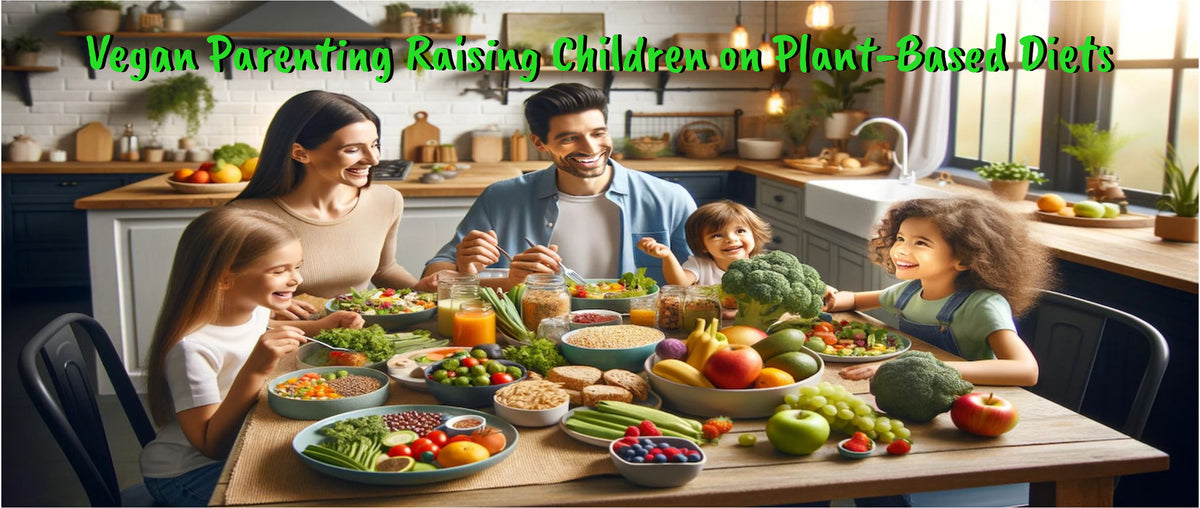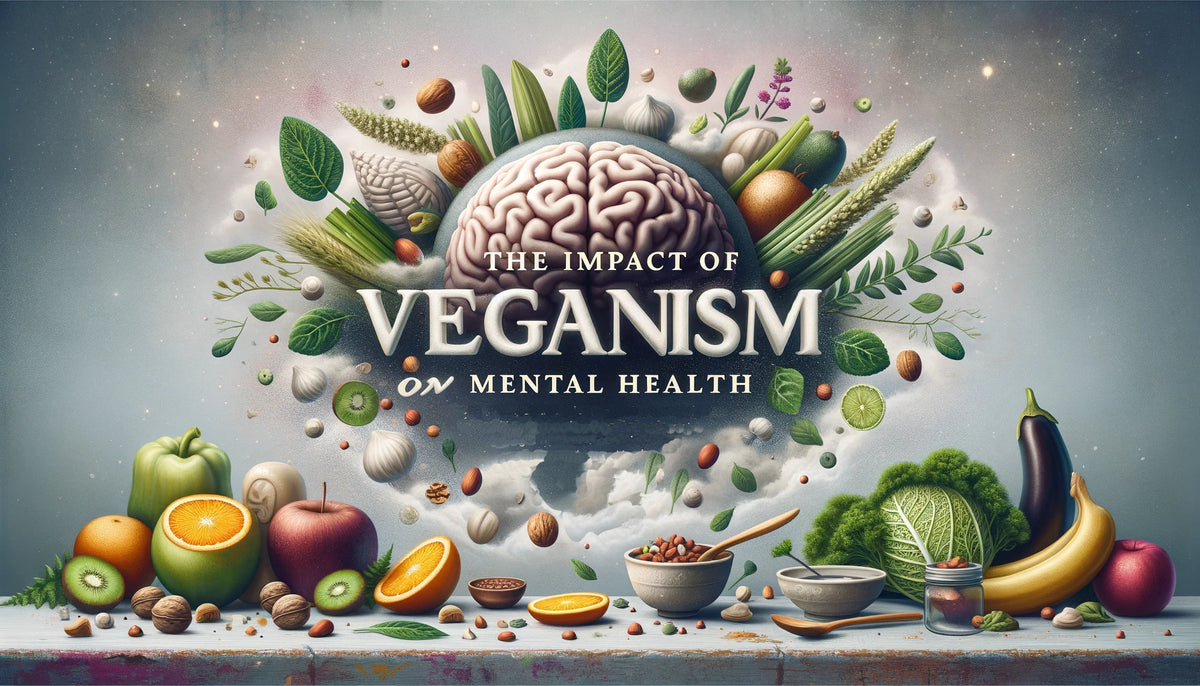Vegan Parenting: Raising Children on Plant-Based Diets
Raising children on a vegan diet can be a rewarding journey that requires thoughtful planning and consideration to ensure children receive the essential nutrients needed for their growth and development. As more families explore plant-based living for health, ethical, and environmental reasons, understanding the specific nutritional needs of children becomes crucial. With the right information and approach, parents can raise healthy, happy children while instilling values of compassion and environmental stewardship.
This guide explores the nutritional aspects that require special attention in a vegan diet for children, practical meal planning tips, and strategies for overcoming common challenges. It also highlights the health benefits of plant-based eating for children and addresses prevalent myths, offering practical advice for successfully navigating this journey.
Whether you're just beginning your vegan parenting journey or looking to fine-tune your child's diet, this guide aims to provide you with the knowledge and confidence to support your child in thriving on a vegan diet.
The Nutritional Considerations of a Vegan Diet for Children
Nutrients of Focus
Raising children on a vegan diet requires careful planning to ensure they receive all necessary nutrients for healthy growth and development. Essential nutrients that need special attention include:
- Protein: Important for growth and repair of body tissues. Vegan sources include lentils, beans, chickpeas, tofu, and fortified plant milks.
- Iron: Crucial for blood production and cognitive development. Plant sources include spinach, lentils, and fortified cereals.
- Zinc: Essential for immune function and cell growth. Found in nuts, seeds, and whole grains.
- Calcium: Necessary for bone health. Vegan sources include fortified plant milks, tahini, and green leafy vegetables.
- Vitamin D: Important for bone health and immune function. Can be obtained from fortified foods and sunlight exposure.
- Vitamin B12: Essential for nerve function and blood formation. Available only in fortified foods or supplements in a vegan diet.
Overcoming Nutritional Challenges
Ensuring a balanced intake of these nutrients involves:
- Incorporating a variety of foods into the diet to cover all nutritional bases.
- Using fortified foods and supplements, particularly for nutrients like B12 and Vitamin D, which are challenging to obtain from plant sources alone.
- Monitoring nutrient intake with the help of a healthcare provider or dietitian, especially for young children, to prevent deficiencies.

Planning and Preparing Balanced Vegan Meals for Kids
Meal Planning Tips
Creating balanced meals that cater to a child's nutritional needs and taste preferences can be both fun and challenging. Here are some tips:
- Start with a base of whole grains like rice, pasta, or bread.
- Add a protein source, such as beans, lentils, tofu, or tempeh.
- Incorporate a variety of vegetables for vitamins and minerals.
- Include a fat source for energy and nutrient absorption, such as avocado, nuts, or seeds.
- Use fortified plant milks to ensure intake of calcium and vitamin D.
Recipes and Food Ideas
Here are some kid-friendly vegan meal ideas:
- Breakfast: Vegan pancakes made with fortified plant milk, topped with fruit and a dollop of almond butter.
- Lunch: Hummus and veggie wraps with a side of fruit.
- Dinner: Lentil spaghetti Bolognese with a side of steamed broccoli.
- Snacks: Fruit smoothies with spinach, fortified plant milk, and a banana.
These meal and snack ideas are designed to be nutritious, delicious, and appealing to children, making vegan parenting a joyful and healthful journey.
Also Read
The Health Benefits of Vegan Diets for Children
Adopting a vegan diet for children not only supports a compassionate lifestyle but also offers numerous health benefits backed by scientific research. Plant based diets are rich in essential nutrients, fiber, and antioxidants which play a pivotal role in promoting optimal health and preventing chronic diseases.
Nutrient-Rich and Balanced Diet
vegan food products, including vegan cheese, plant-based foods, and vegan butter , are crafted to provide essential nutrients without the cholesterol and saturated fats found in animal products. These cholesterol free foods contribute to a heart-healthy diet, reducing the risk of heart disease from a young age.
Environmental Impact and Ethical Considerations
Raising children on a vegan diet not only focuses on health but also instills values of compassion and environmental stewardship. Choosing plant based products over animal-derived ones reduces the environmental footprint, supporting a sustainable future for our children.
Improved Digestive Health
Plant-based diets are high in dietary fiber, which is beneficial for the digestive system. Children consuming ample fruits, vegetables, and whole grains experience fewer digestive issues and maintain a healthy gut microbiome.
Addressing Common Concerns and Myths About Vegan Diets in Children
Embarking on the journey of vegan parenting comes with its set of challenges and concerns. It's crucial to address common myths and provide factual information to ensure parents feel confident in their choice.
Meeting Nutritional Needs
A common concern is whether children can receive all necessary nutrients from a vegan diet. With careful planning and inclusion of plant-based foods such as Cashew Butter, low fat mayonnaise, and fat-free butter, all nutritional requirements can be met. Supplements and fortified foods play a key role in providing nutrients like Vitamin B12 and Vitamin D.
Protein and Calcium Sources
Protein and calcium are often cited as nutrients of concern in a vegan diet. However, plant based foods offer rich sources of these nutrients. Vegan Products in india like plant-based cheese and fortified plant milks are excellent sources of calcium, while beans, lentils, and tofu provide ample protein.
Social and Dietary Inclusivity
Another aspect of vegan parenting is navigating social situations and ensuring children feel included. Many Vegan Shop and restaurants now offer a wide range of vegan items, making it easier for vegan children to enjoy a variety of foods without feeling left out.
By addressing these concerns and debunking myths, parents can feel more assured in their decision to raise their children on a vegan diet, knowing they are providing a nutritious, ethical, and environmentally-friendly lifestyle.

Practical Tips for Vegan Parenting
Implementing a vegan diet for children can seem daunting at first, but with the right knowledge and tools, it can be a rewarding experience. Here are practical tips for successful vegan parenting:
Diversifying the Diet
A diverse diet is key to ensuring that children get all the nutrients they need. Incorporate a wide range of plant based foods into meals, including whole grains, legumes, fruits, vegetables, nuts, and seeds. Variety not only ensures nutritional adequacy but also helps children develop a palate for different flavors and textures.
Incorporating Vegan Alternatives
Thanks to the growing demand for vegan products, there are numerous delicious and nutritious plant-based alternatives available. Vegan cheese, plant based cheese, and vegan butter can easily replace their dairy counterparts in any recipe, making it easier to transition to a vegan diet without sacrificing familiar tastes.
Ensuring Adequate Protein Intake
Protein is crucial for growth and development. Plant based sources of protein such as lentils, beans, tofu, and quinoa are excellent options. Vegan food products often contain added protein, making it easier to meet dietary requirements.
Focusing on Whole Foods
While vegan items like Cashew Butter, vegan mayo, and fat-free butter are convenient and can add variety, the focus should be on whole, minimally processed foods. These provide the best nutritional value and are fundamental to a healthy vegan diet.
Supplementing Wisely
Certain nutrients, such as vitamin B12, vitamin D, omega-3 fatty acids, and iron, may require careful attention or supplementation. Consult with a healthcare provider to determine if supplements are necessary and which ones are best suited for your child's needs.
Educating and Involving Children
Teach children about the benefits of a vegan diet, both for their health and the environment. Involvement in meal planning and preparation can also encourage them to embrace veganism and make informed food choices.
Creating a Supportive Community
Connect with other vegan families online or in your community. Sharing experiences, tips, and recipes can provide valuable support and inspiration.
By incorporating these strategies, parents can confidently navigate the journey of raising children on a vegan diet, ensuring they grow up healthy, happy, and compassionate towards animals and the environment. With the right approach, vegan parenting can be an enriching experience that contributes positively to the entire family's well-being.
If you are a vegan, looking to dine something vegan in your city, check out our list of vegan restaurants in India.










